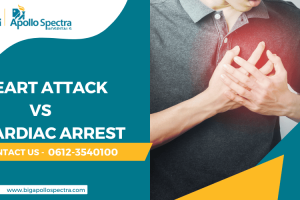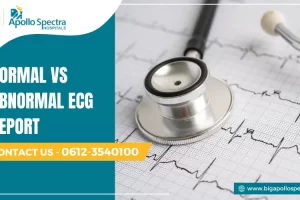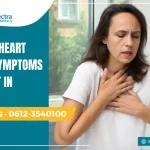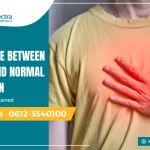Arrhythmia refers to a heart condition which interferes with the regular heart rhythm pattern leading to fast, slow, or irregular heartbeats. Arrhythmia emerges when cardiac electrical signals malfunction and disrupt the normal heart rhythm.
Some heart arrhythmias are benign yet certain types can lead to severe health complications including stroke as well as heart failure or sudden cardiac arrest.
Efficient blood circulation relies on a healthy heart rhythm to deliver oxygen and nutrients throughout the body. Persistent arrhythmia produces symptoms like dizziness and chest pain which impacts daily life negatively.
Patients often ask will arrhythmia go away on its own without any medical intervention. The answer depends on the underlying cause. There are arrhythmias that can go away naturally but others need medical treatment.
This blog covers the possibility of arrhythmia going away on its own along with its causes. We will also get into all the possible medical intervention and lifestyle adjustments for its management.
Will Arrhythmia Go Away on Its Own?
Arrhythmia episodes frequently disappear on their own without medical treatment when the causes behind it are stress, dehydration, caffeine consumption or alcohol use. However, long-standing heart rhythm conditions like atrial fibrillation frequently need medical intervention to avoid further health problems.
There is no way for you to know for certain whether your arrhythmia requires treatment or will go away on its own. If you have symptoms, the best way forward would be to consult a heart specialist.
The top cardiologist in Patna must evaluate your arrhythmia to determine if it is temporary or needs medical intervention.
Electrocardiograms (ECGs), Holter monitors, and stress tests function as diagnostic tools to evaluate the seriousness of the medical condition.
- Temporary arrhythmias – Lifestyle factors can cause temporary arrhythmias which tend to disappear once the root issue is treated.
- Chronic arrhythmias – Most chronic arrhythmias develop from structural heart problems, hypertension, or other medical conditions and usually need ongoing medical supervision.
Eliminating stimulants along with stress management and proper hydration can help resolve benign arrhythmias and restore a normal rhythm. Serious arrhythmias require treatment with medication, lifestyle changes or even catheter ablation procedures in some cases.
There is a common question about how long can you live with irregular heartbeat.
The duration of life expectancy for those who suffer from arrhythmia depends on how severe their condition actually is.
While some individuals who have minor arrhythmic irregularities may be able to survive decades, other people may experience an elevated risk of developing serious conditions like stroke or heart failure. Thus, the only way forward for you is to seek a proper evaluation and treatments to cure arrhythmias effectively.
Potential Causes and Risk Factors of Arrhythmia
Arrhythmia often develops because of multiple factors. These causes may include genetic predisposition, lifestyle habits as well as any medical conditions that you may have.
Knowing what is causing arrhythmia in your case, though, will help you in developing prevention strategies and managing pre-existing conditions.
1. Genetic Factors
Inherited conditions from family members often increase people’s susceptibility to irregular heartbeats. Genetic mutations have the potential to modify both heart structure and electrical activity.
2. Lifestyle Factors
Certain lifestyle habits can trigger arrhythmia. The most common culprit is an overall unhealthy lifestyle with excessive alcohol drinking and lack of a proper sleep schedule.
So, take care of the following habits if you want to avoid arrhythmia in the long run:
- Excessive consumption of caffeine and alcohol
- Very high levels of stress and anxiety
- Lack of a sleep schedule and dehydration
- Smoking and drug use
To minimize arrhythmia risk in these cases, it’s important that you avoid the consumption of high amounts of caffeine and alcohol, and you should, in fact, stop smoking too.
Establishing regular sleep patterns and ensuring you drink enough water is equally important for you.
3. Underlying Medical Conditions
Arrhythmia risk increases particularly in the cases where individuals suffer from heart disease, high blood pressure, thyroid disorders, or diabetes.
Moreover, the use of specific medications such as stimulants and beta-blockers can also lead to abnormal heartbeats.
4. Electrolyte Imbalance
Calcium, magnesium, and potassium are the minerals that are responsible for the maintenance of the heart functions.
If these electrolytes are unbalanced, your heart rhythms may not be normal as they can disturb the cardiac electrical signals.
In addition to everyday lifestyle-related factors, arrhythmia can also develop under the influence of serious illnesses that often require treatment. Atrial fibrillation (AFib) is one of them.
It is the most common type of arrhythmia and usually occurs due to age and health conditions such as high blood pressure and heart disease.
When Should I Be Worried About an Irregular Heartbeat?
It’s important to remember that irregular heartbeats may not always be dangerous, except some symptoms that require immediate attention.
Medical intervention, in fact, becomes essential when arrhythmia appears often or presents itself along with additional symptoms.
Seek immediate medical care if you experience the following symptoms:
- Persistent dizziness or fainting episodes.
- Shortness of breath or difficulty breathing.
- Pain in chest area or tightness.
- Rapid, pounding, or extremely slow heartbeat.
- Your heart often feels like it skips beats.
These symptoms can signal an elevated risk of sudden cardiac death. Therefore, do not be late to have a doctor check you out in case you start having any of these symptoms.
The doctor will conduct the tests and determine the proper treatment that might be a lifesaver for you.
Treatment Options and Their Effectiveness
Treatment is available for different types of arrhythmias, and it varies based on the severity and the underlying cause as well.
Both lifestyle simplifications and surgical methods are the ways the professionals use to manage the condition.
1. Medications
Normally, the professionals recommend the use of drugs as the primary method to control arrhythmias and to prevent other complications.
- Beta-blockers and calcium channel blockers – A combination of beta-blockers and calcium channel blockers is often used by doctors for treatment because they reduce rapid heart rate.
- Antiarrhythmic drugs – These drugs are mainly prescribed by your doctor to regulate the heart rhythm and keep it normal.
However, antiarrhythmic drugs may have side effects. Among the side effects that can be caused by antiarrhythmic medications when people consume them are fatigue and dizziness.
2. Non-Invasive Treatments
There are different arrhythmias and means of treating them.
- One of the methods that can be successful in stopping some types of arrhythmia is performing vagal maneuvers using coughing or bearing down.
- Lifestyle changes are among the best ways of dealing with the progression of arrhythmic symptoms. To that end, people can easily get relief from the condition by minimizing stress and quitting stimulants’ use.
3. Advanced Procedures
For more severe cases, doctors are likely to suggest that the matter be managed with:
- Catheter ablation, which is a procedure that involves the destruction of the heart tissue that is not functioning well.
- Pacemakers with Implantable Defibrillators (ICDs) are medical devices meant for heart rhythm management as well as for sudden cardiac arrest prevention.
- Cardioversion is a controlled electric discharge delivered to the heart through an electrode patch located on the chest of the patient in order to revert the heart to a normal rhythm.
All these treatments are designed to help make heart rhythm normal and prevent complications.
However, if you’re wondering what is the best treatment for irregular heartbeat, the answer might be mixed. First off, treatment selection depends on the patient’s specific condition.
But it’s a fact that the treatment process frequently requires a combination of medications and lifestyle modifications together with medical procedures, when needed.
Lifestyle Changes to Manage or Reduce Arrhythmia
Making lifestyle modifications leads to both the prevention and control of arrhythmia which in turn boosts heart health.
1. Regular Exercise
Some moderate physical exercise leads to improvements in the heart’s ability to pump out blood and the amount of blood in the circulation of the whole body.
High-intensity exercise regimes, however, can increase the risk of arrhythmia, so patients should consult their doctor before starting such workouts.
In response to patients questioning whether arrhythmia can be cured without medicine and just some exercise, we state that the answer is not a yes. Exercise doesn’t cure arrhythmia, but it does help ease symptoms and improve heart health.
2. Heart-Healthy Diet
Diet is the very first step to keep your heart working properly. Eating foods containing potassium is a preventive measure for cardiovascular health that can be taken along with consuming omega-3 fatty acids from fish and walnuts.
If you want your heart rate to be steady, then consuming caffeine, alcohol, and high sodium foods in small quantities would be the go-to choice, which will reduce the possibility of heart attack too.
3. Stress Management
Proper care and adequate coping skills will give the person a good chance to manage the factors that create stress and prevent arrhythmia. The use of both mindfulness and yoga, including deep breathing, can have a beneficial effect on one’s heart rate.
Thus, try meditation, deep breathing, or yoga. Moreover, it is recommended to stick to a healthy sleep schedule as well as to try to find the right balance between work and personal life.
This approach might help people to better balance their personal relationships so that they may feel more calm, satisfied, and enjoy the process.
4. Avoid Smoking and Alcohol
The intake of nicotine and alcohol causes overstimulation of the heart that elevates the risk of developing irregular heart rhythms.
Reducing arrhythmia episodes is possible in this case through quitting smoking and drinking less alcohol or quitting it altogether.
5. Regular Check-Ups
Regular appointments with a cardiologist help to control arrhythmia effectively. Doctors might suggest ECGs or Holter monitoring systems to monitor heart rhythms for extended periods.
Advanced Cardiac Care to Protect Your Heart
While some instances of arrhythmia can sometimes go away on its own without treatment others require medical procedures for effective and timely resolution.
Effective management of arrhythmia through medications, lifestyle changes or medical procedures helps to decrease complications and enhance heart function.
Big Apollo Spectra stands as the top heart hospital Patna facility for patients who are experiencing irregular heartbeats and want to seek expert consultation and complete cardiac care.
A team of expert cardiologists delivers precise diagnoses and individualized treatment plans, depending on every individual case.
Taking preventative actions now will help protect against significant heart diseases. In fact, it’s best to schedule a medical check-up immediately if you have arrhythmia concerns.
Expert heart specialists will not only alleviate your fears but will also help manage the condition with an action plan and suitable medical treatments.





